- Tri-County Community College is an accredited, comprehensive, publicly-supported, two-year post-secondary institution which operates in accordance with North Carolina Law and the administrative policies of the North Carolina Community College System. Located in the westernmost tip of North Carolina, the College serves commuter students in a remote, rural area consisting of Cherokee, Clay, and Graham Counties by providing college transfer, vocational, technical, and adult education programs.
School Highlights
Tri-County Community College serves 1,265 students (40% of students are full-time).
The college's student:teacher ratio of 7:1 is lower than the state community college average of 13:1.
Minority enrollment is 22% of the student body (majority Hispanic), which is less than the state average of 48%.
Quick Stats (2025)
- Enrollment: 1,265 students
- In-state tuition: $2,363
- Out-state tuition: $8,507
- Student:teacher ratio: 7:1
- Minority enrollment: 22%
- Source: Integrated Postsecondary Education Data System (IPEDS)
Top Rankings
Tri-County Community College ranks among the top 20% of public schools in North Carolina for:
Category
Attribute
School Resources
School Overview
The teacher population of 178 teachers has stayed relatively flat over five years.
Tri-County Community College
(NC) Community College Avg.
Carnegie Classification
Associate's Colleges: High Transfer-High Nontraditional
Associate's Colleges: Mixed Transfer/Career & Technical-High Nontraditional
Institution Level
At least 2 but less than 4 years
At least 2 but less than 4 years
Institution Control
Public
Public
Total Faculty
178 staff
256 staff
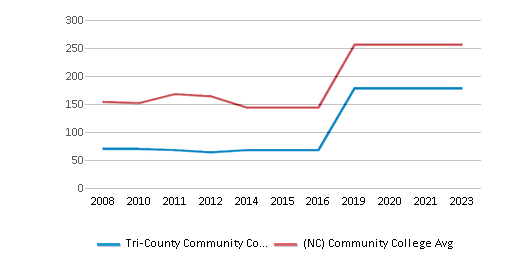
School Calendar
Student Body
The student population of Tri-County Community College has grown by 16% over five years.
The student:teacher ratio of 7:1 has increased from 6:1 over five years.
The Tri-County Community College diversity score of 0.38 is less than the state average of 0.66. The school's diversity has grown by 70% over five years.
Total Enrollment
1,265 students
2,542 students
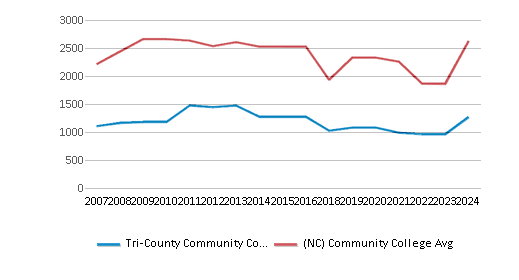
Student : Teacher Ratio
7:1
13:1
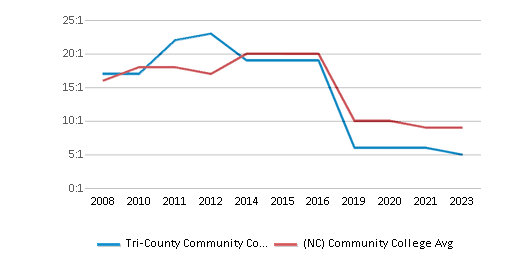
# Full-Time Students
501 students
766 students
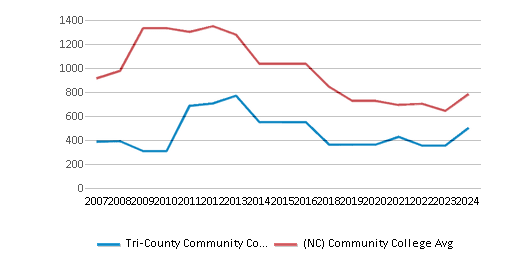
# Part-Time Students
764 students
1,813 students
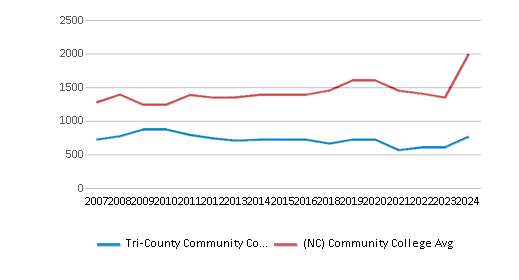
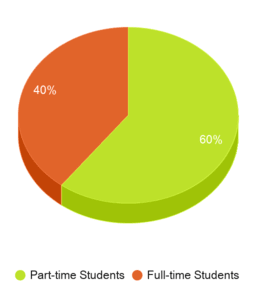
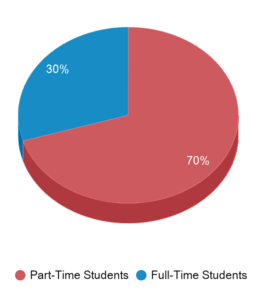
# Enrollment Undergraduate
126 students
316 students
# Full-Time Undergraduate Students
501 students
766 students
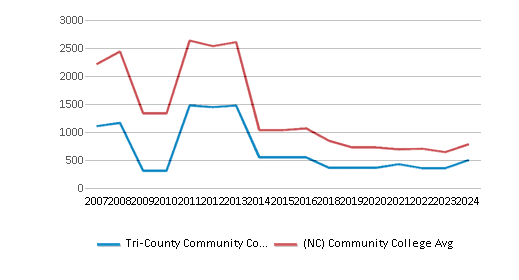
# Full-Time Graduate Students
n/a
22 students
# Part-Time Undergraduate Students
764 students
1,990 students
# Part-Time Graduate Students
n/a
3 students
Total Dormitory Capacity
n/a
717 students
% American Indian/Alaskan
1%
1%
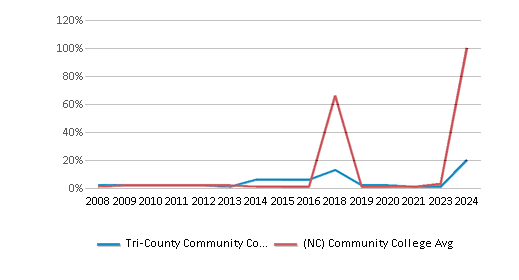
% Asian
1%
3%
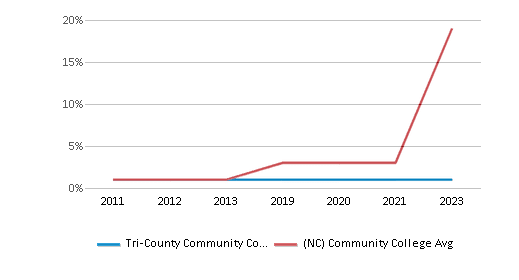
% Hispanic
6%
13%
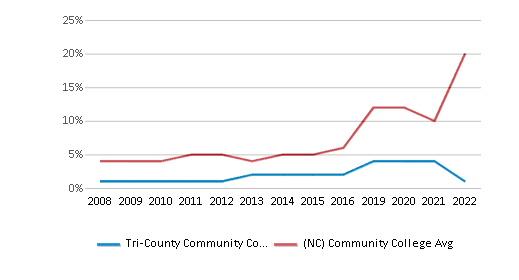
% Black
2%
21%
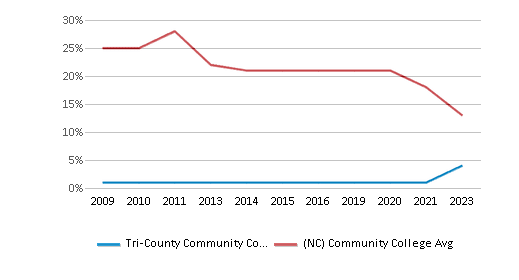
% White
78%
52%
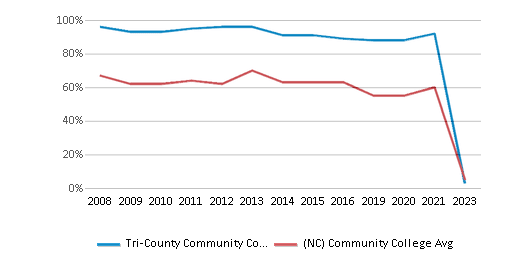
% Hawaiian
7%
1%
% Two or more races
3%
3%
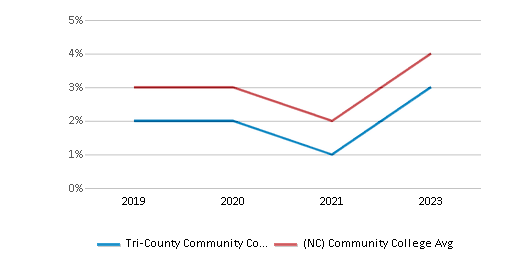
% Non Resident races
n/a
1%
% Unknown races
2%
5%
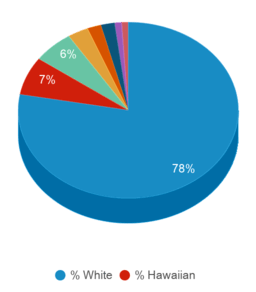
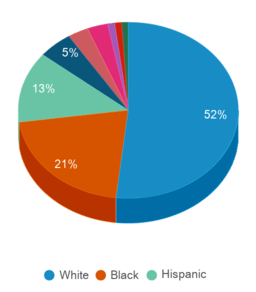
Diversity Score
0.38
0.66
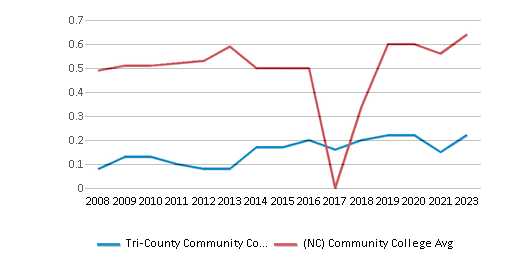
College Completion Rate (Students who graduate in less than 4 years)
0.3684%
0.3684%
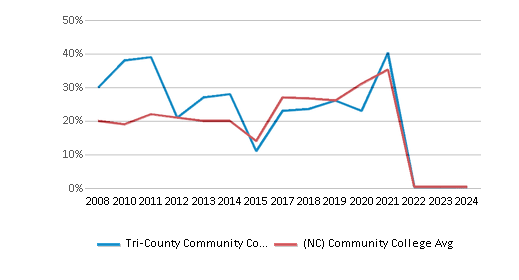
College Completion Rate (Students who graduate in 4 years or more than 4 years)
n/a
0.4286%
Average Graduate Earnings (10 Years)
$24,300
$27,500
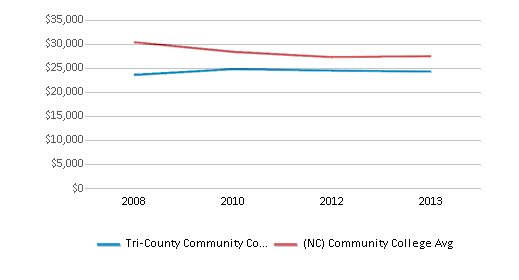
Tuition and Acceptance Rate
The public in-state tuition of $2,363 is less than the state average of $3,915. The in-state tuition has declined by 5% over four years.
The public out-state tuition of $8,507 is less than the state average of $9,508. The out-state tuition has stayed relatively flat over four years.
In-State Tuition Fees
$2,363
$3,915
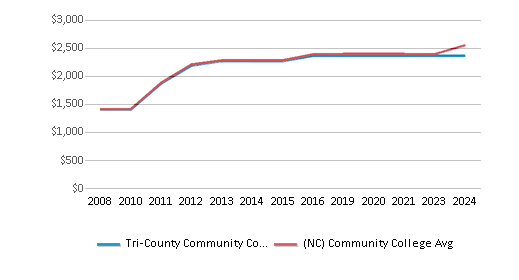
Out-State Tuition Fees
$8,507
$9,508
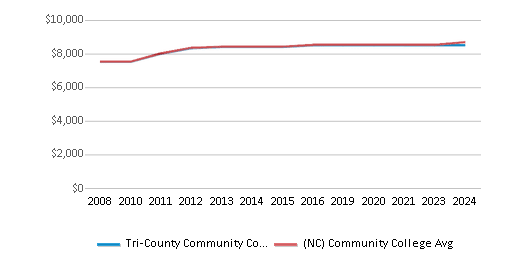
% Students Receiving Some Financial Aid
97%
82%
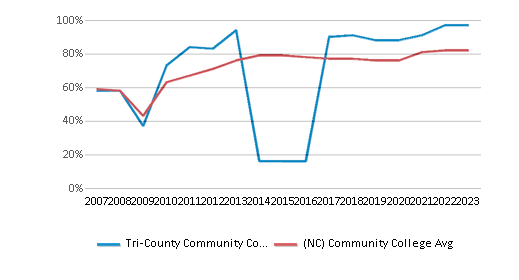
Median Debt for Graduates
$11,500
$10,500
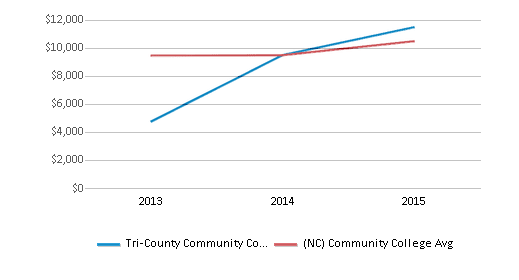
Median Debt for Dropouts
$9,500
$6,000
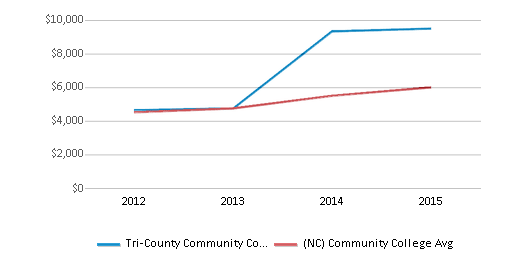
Acceptance Rate
n/a
82%
SAT Reading
n/a
488
SAT Math
n/a
498
ACT Composite
n/a
20
ACT English
n/a
13
ACT Math
n/a
16
Source: 2024 (or latest year available) Integrated Postsecondary Education Data System (IPEDS)
School Notes
- The roots of Tri-County Community College date back to mid 1964, when political and educational leaders of Cherokee County met with representatives of Asheville-Buncombe Technical Institute. That same year, the North Carolina State Board of Education approved The Tri-County Industrial Education Center to operate as a part of the State Department of Community Colleges. Tri-County Community College have two campuses. Both are located in areas of the Blue Ridge and Appalachian mountains that are among the most beautiful and charming places on earth. Quality of life is high. Costs are low. Outdoor recreation opportunities abound, attracting visitors from around the world, year-round. We have no residential facilities on campus, but there are plenty of folks near us who can accommodate student housing needs. Academic programs currently being offered are designed within one of the following general categories: Technical-Programs classified as technical confer an Associate in Applied Science Degree. These programs are normally four or five semesters in length; General Education- The general education program confers an Associate Degree. This program is normally four semesters in length, and it is designed for those individuals who normally desire only two years of college; College Transfer- The program classified as college transfer confers an Associate in Arts Degree. This program is normally four semesters in length and is designed for individuals who plan to transfer to a senior institution for completion of a four year degree. The college is accredited by the Commission on Colleges of the Southern Association of Colleges and Schools to award associate degrees.
Frequently Asked Questions
How much does Tri-County Community College cost?
Tri-County Community College's tuition is approximately $2,363 for In-State students and $8,507 for Out-State students.
What is Tri-County Community College's ranking?
Tri-County Community College ranks among the top 20% of community college in North Carolina for: Percent of students receiving financial aid.
Recent Articles

Obtaining Your Bachelor's Degree at a Community College
Explore the evolving landscape of community colleges offering bachelor's degrees, addressing affordability, accessibility, and workforce needs.

A to Z of Community College Certificates and Courses
From business and healthcare to technology and skilled trades, the article showcases the breadth of options available to students seeking to enhance their knowledge, develop new skills, or pursue career advancement.

What is a Community College?
This comprehensive guide explains what a community college is, its history, and its role in higher education. It covers the types of programs offered, differences from four-year colleges, benefits of attending, and important considerations for prospective students, providing valuable insights for those exploring educational options.











